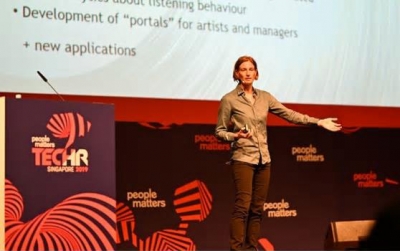New jobs, new directions: The impact of leveraging AI in the music business

In a session at TechHR 2019 Singapore, Dorien Herremans from ISTD shared insights from emerging research about how artificial intelligence technologies are changing the music business. Traditional recording companies are already making a pivot, says Dorien Herremans, an Assistant Professor at SUTD. She notes that a number of companies now employ big teams of software engineers, not just to work with streaming music sites, they also need to be able to protect their MP3 and therefore need experts in cyber security. And AI is offering new and interesting possibilities in generating and disbursing music itself. Dorien spoke about three areas where the use of AI is being studied.
Music recommendation
AI based algorithms leverage genre preferences, and social media profiles of the user to recommend new music. There’s a strong correlation between music and emotion, says Dorien. When listening to music, it can typically easily evoke certain emotions. Using an annotated emotions dataset, we can train AI models to help us make music recommendations based of desired emotional states.
Hit song prediction
In the music business, there is a lot riding on the success of hit singles. The cost of breaking a new artist is estimated to be around $500,000 to $2 million USD. A study of the datasets on dance hit songs from 1985 to 2013, revealed that music preferences change. For instance, over time, the songs have been getting shorter, and louder. It was Dorien who did this study. During her PhD study, she used data to create data science models to predict if a particular song would top the charts. The model, according to Dorien, correctly identified hit songs with 80 percent accuracy for dance music.
Creating music
A third area where AI is being leveraged is to create music itself. “Music is more than a sum of its parts” Dorien says, explaining that generating music is hard. There are two main problems: 1) Music and emotion are strongly related. Computers aren’t good at feeling emotion; and 2) When we like a song, it’s usually something that sticks to our mind. Computers aren’t equipped to deal with long term structures and often rely on song templates. Nevertheless, a handful of start-ups are already offering AI algorithms that produce simple background music.
Contact Assistant Professor Dorien Herremans at dorien_herremans@sutd.edu.sg
